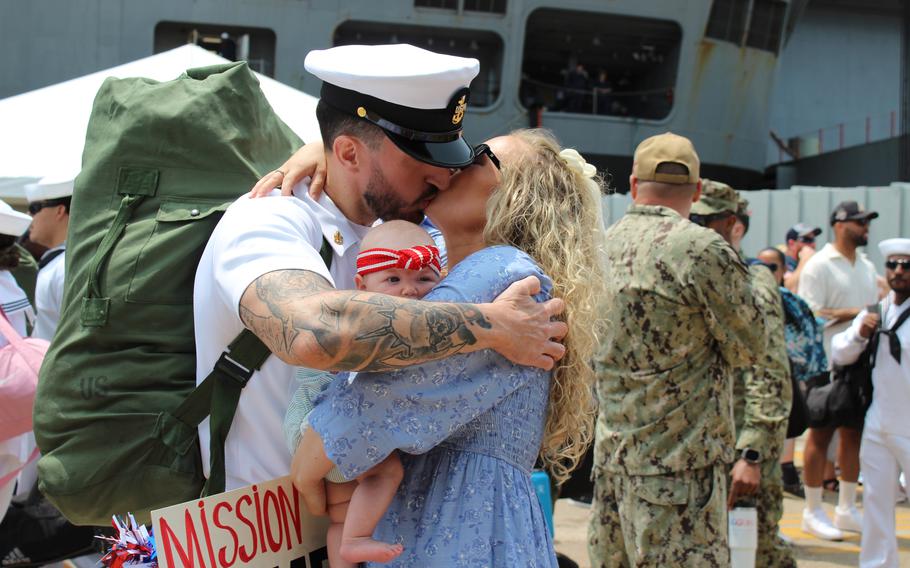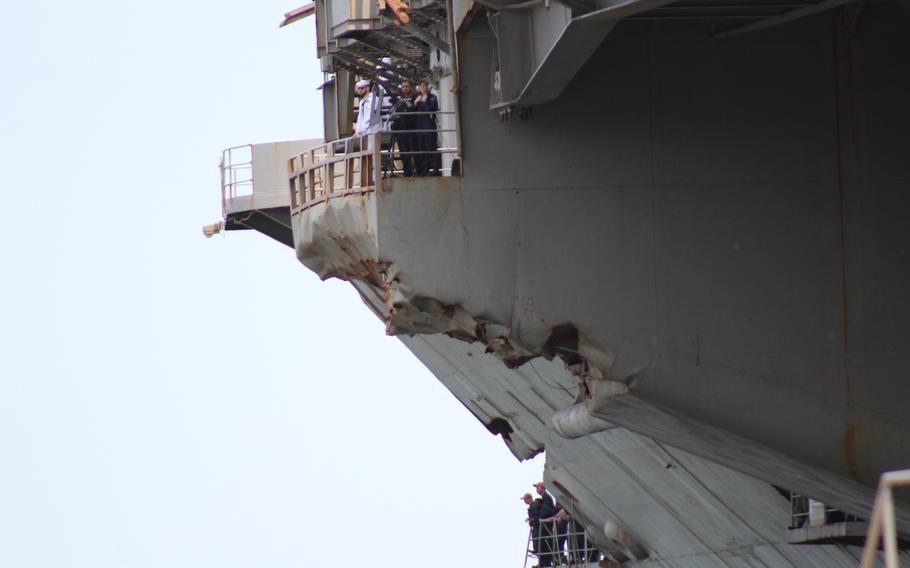
Jordan Wallace greeted her husband and sailor with a kiss, while cradling the couple’s 3½-month-old daughter, Maren. (Caitlyn Burchett/Stars and Stripes)
NORFOLK, Va. — “The ship is coming!” a disembodied voice shouted from a cheering crowd as the USS Harry S. Truman approached the pier.
Thousands of flag-waving, sign-carrying loved ones welcomed the aircraft carrier and its sailors home Sunday following a brutal eight-month deployment that was marred by conflict and mishaps.
A banner of the combat action ribbon was stretched across the island of the carrier, and on the right side of the ship’s flank, large gashes jutted out from a collision — both evidence of what the Truman and its crew had been through.
“These sailors stepped up day in and day out. They did not cower. They did not fall back. They just kept fighting and fighting,” said Capt. Christopher Hill, the commanding officer of the Truman.
The Truman conducted 50 days of continuous strikes, including the launch of Tomahawk land attack missiles and precision airstrikes, meant to degrade Houthi capabilities and disrupt threats to commercial shipping. All in all, Hill said the Truman fired more than 1.1 million pounds of ordnance against enemy targets. Of that, 125,000 pounds were launched against Islamic State terrorists in northeast Somalia in what the Navy has called the largest airstrike in history launched from an aircraft carrier.
“We didn’t just deploy. We delivered,” said Rear Adm. Sean Bailey, commander of the strike group. “We were ready to confront any adversary with top-notch warfighting lethality and readiness, and I could not be more proud of what we achieved.”
While leadership characterized the Truman’s deployment based on its successes, the strike group was also plagued with mishaps, including the loss of three fighter jets that cost about $67 million each. The carrier also collided with a cargo ship, and the commanding officer was fired. Leadership declined Sunday to discuss the costly incidents, citing ongoing investigations.
“The main takeaway is: We learn lessons. We are a learning organization, not only within the strike group, but within the Navy writ large,” Bailey said. “Everything we did — the unique set of circumstances in the environment — helps inform the future. It will help empower our successes, not only in similar operations, but certainly in the future fight.”
After the Truman was moored, sailors flocked to the right side of the flight deck in hopes of spotting their loved ones. Some sailors, donning their dress whites, jumped and waved at the cheering crowds on the pier.
On the pier, Brian Walker intently looked up at the flight deck — he clenched a bouquet of pink roses for Candice Walker, his wife and an administrative officer on the Truman. His daughter, 11-year-old Brianna, toted a homemade sign. This was the family’s third deployment, but it was by far the longest and most difficult, Walker said.
“I just want to hold her, kiss her,” Walker said, tears welling up in his eyes. “It has been so long.”
The twice-extended deployment separated the sailors from their loved ones for 251 days. They spent birthdays, holidays and major milestones apart.
Around noon, thousands of sailors began spilling out. Loved ones erupted with cheers, laughter and tears — running to embrace their sailors. The wait was over.
Thomas Whiteley, 10, bounced with excitement while waiting for his father, Jacob Whiteley.
“Finally, my dad is home, and we can be happy,” Thomas said.
The homecoming concludes 24,000 nautical miles sailed across Europe and the Middle East. Components of the Truman strike group were welcomed in the days prior to homeports and bases across the East Coast. The last to return, cruiser USS Gettysburg, will be welcomed home to Naval Station Norfolk, Va., in the coming days.
The Truman was also supported by destroyer USS Stout, homeported at Norfolk, and destroyer USS Jason Dunham, homeported at Naval Station Mayport, Fla. A nine-squadron air wing with around 80 aircraft deployed aboard the ships.
In total, the Truman launched more than 13,000 aircraft from its flight deck, which logged around 25,000 flight hours. Components of the strike group also made port calls to Norway, Sweden, Finland, Germany, Spain, France, Croatia and Greece while deployed.
“The warrior ethos demonstrated by the U.S. Navy sailors in the Red Sea will not be forgotten by me or anybody else who witnessed it firsthand,” Hill said. “Absolutely eye-watering.”

Gashes in the right side of the USS Harry S. Truman’s flank were visible as the aircraft carrier moored at Naval Station Norfolk, Va., on Sunday, June 1, 2025. The damage occurred when the carrier collided with a cargo ship in February while deployed. (Caitlyn Burchett/Stars and Stripes)